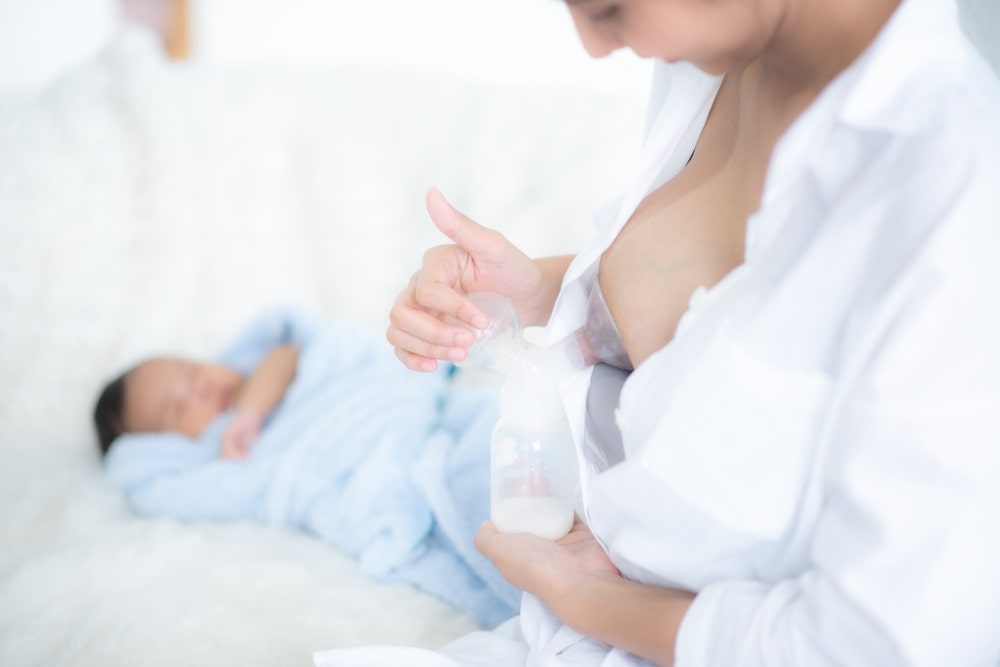Your body goes through some enormous changes when you are pregnant and your breasts are no different. From increased size to leaking nipples we have looked at all the changes, what is normal and what is a cause for concern.
9 Changes That Your Breast Go Through During Pregnancy
During pregnancy, your breasts are going to go through some huge changes and it is unlikely that they will ever be the same again.
So here are a few changes that you can expect throughout your 9 months and beyond. The changes in your breast may be the first thing that you notice once you are pregnant.
1. They Get Big
Right from the beginning, your breasts are going to increase in size this is due to an increase in fatty tissue and blood flow.
This extra tissue and blood are there in order to help your milk ducts and mammary glands grow. By around six weeks into your pregnancy, your breasts may have grown a full cup size.
2. They Will Hurt
There is a downside to your instant boob job and that is that your breast will become very tender.
This is due to all the extra blood, swollen tissue, and fluid retention that can leave your chest sore and aching. In fact, sore breasts are one of the first signs of pregnancy.
3. They Get Heavy
This is kind of a side effect of all that increased blood, swollen tissue, and fluid retention. By month nine of your pregnancy, the average woman has gained around two pounds just in her breasts.
4. They Get Veiny
As your pregnancy progresses you may start to have a more noticeable map of blue veins trailing across your breasts. these veins are more noticeable simply because they are dilating to accommodate that increased blood flow.
5. Your Nipples Become More Noticeable
Your nipples will start to take center stage as they grow and become more defined. Also, the areola gets much larger and darker, which is a direct result of high levels of estrogen.
The glands that are dotted around the areola called the Montgomery glands also begin to get larger and produce an oily substance. This substance protects your nipples and areolas from cracking or drying out during this process.
View in gallery
6. They Might Leak
In the second or third trimester, you may notice that your breasts start to leak from your nipples.
That golden substance is called colostrum, which is the initial milk that your body produces midway through pregnancy, and during the first few days after she delivers.
This thick highly concentrated fluid can also just dry and crust on the nipples. While other women may find that their breasts squirt or leak milk.
7. They Will Get Stretch Marks
With all that extra blood and swollen tissue, your breast skin gets stretched and that, unfortunately, can lead to stretch marks.
As your skin is stretched your breast may begin to itch, keep the skin supple by applying moisturizer after showering and even before bed.
8. They Definitely Need Your Support
This is the time to invest in a good quality supportive bra. This will be crucial to relieving the new extra weight of your ever-increasing breasts and to support your back.
The best type of bra to look for is one with a thick band beneath the cups, wide shoulder straps, and an adjustable closure. Cotton bras will be better than synthetic ones as they are more comfortable because they allow the skin to breathe.
They will even need support at night so a good cotton sports bra or maternity bra will be more comfortable while you sleep.
9. They Will Never Be The Same Again
Once your baby is weaned your nipples will go back to their regular color and size. Your breasts will return to roughly the same size as they were pre-pregnancy.
But remember because your skin has been stretched, the loose skin and stretch marks are more than likely going to stay there.
Is It Normal To Have Crusty Nipples?
This is perfectly normal and is down to your body producing the first drops of colostrum. This amazing substance is the first and highly concentrated drops of breast milk.
You may find that your nipples are either leaking this liquid or your nipples may have a dry crusty coating. This dry crusty coating is where the colostrum has dried and created a crusty barrier over your nipples.
View in gallery
Extremely Dry Nipples And What To Do
If you are pregnant and suffering from extremely dry nipples it could lead the skin on them to crack and become increasingly sore.
You can treat cracked and sore nipples in a variety of ways depending on when the problem occurs. Here are a few suggested treatments:
1. Apply Freshly Expressed Breast Milk
Smoothing freshly expressed breast milk on your cracked nipples will help with the healing due to its antibacterial protection. Make sure that you wash your hands before applying a few drops gently to the area and leaving to air dry.
2. Warm Compress
- NEVER SPOILS OR MOLDS - Unlike rice or corn heating pads, these pads will never spoil, mold, or smell. The beads we put in the bag are odor free, toxic free, unscented, and reusable with no additives.
- COMFORT AND SOOTHING - Will ease pain and increase blood flow to affected areas. It is very soft to the skin. The outside is made of a micro fleece that feels like a pillow. Moist heat treatment is perhaps the most relaxing of all the physical therapy modalities.
Prices pulled from the Amazon Product Advertising API on:
Product prices and availability are accurate as of the date/time indicated and are subject to change. Any price and availability information displayed on [relevant Amazon Site(s), as applicable] at the time of purchase will apply to the purchase of this product.
There is no antibacterial benefit to using a warm compress but it can offer some relief by soothing sore, cracked nipples. Just dip a washcloth in warm water and wring out any excess liquid.
Place the washcloth over your nipple and breast for a few minutes and then gently pat dry.
3. Salt Water Rinse
This is just a homemade saline solution that will help hydrate the skin and promote healing.
- Mix 1/2 teaspoon of salt in 8 ounces of warm water
- Soak your nipples in a small bowl of the warm solution for about one minute.
- You could also use a squirt bottle to apply the solution with more ease.
- Pat gently to dry or leave to air dry
Remember that you will need to make a fresh saline solution every day in order to reduce the chance of bacterial infection.
4. Apply Medical Grade Lanolin Ointment
Using a lanolin ointment designed for breastfeeding mothers will help promote moist wound healing. Apply to nipples and leave.
- #1 RECOMMENDED BRAND: Lansinoh Lanolin is the #1 recommended nipple cream by moms and doctors in the US. Clinically tested. Lansinoh Lanolin soothes and protects sore nipples for breastfeeding moms.
- SAFE FOR MOM & BABY: No need to remove before breastfeeding. Specially designed for nursing, 100% natural and hypoallergenic. Free from preservatives, parabens, fragrance or taste.
- RELIEF FOR SORE NIPPLES: Thick, rich cream soothes and protects sore nipples. Clinically proven and ultra-pure. Our single ingredient lanolin has a unique purification process to remove impurities with no added additives.
Prices pulled from the Amazon Product Advertising API on:
Product prices and availability are accurate as of the date/time indicated and are subject to change. Any price and availability information displayed on [relevant Amazon Site(s), as applicable] at the time of purchase will apply to the purchase of this product.
The Final Thought
Pregnancy can be tough on your body and your breasts are no different. Dry, cracked nipples are a common issue during pregnancy and are perfectly normal.
But very few women find the time to care for their bodies even when their bodies are doing such an important job-creating new life. However, ignoring parts of your body that are going through such big changes can be a recipe for disaster after birth.






